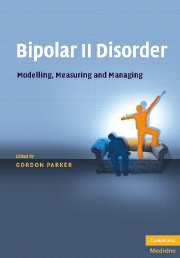Book contents
- Frontmatter
- Contents
- List of contributors
- Preface
- Introduction
- 1 Bipolar disorder in historical perspective
- 2 The bipolar spectrum
- 3 Defining and measuring Bipolar II Disorder
- 4 Bipolar II Disorder in context: epidemiology, disability and economic burden
- 5 Is Bipolar II Disorder increasing in prevalence?
- 6 The neurobiology of Bipolar II Disorder
- 7 The role of antidepressants in managing Bipolar II Disorder
- 8 The use of SSRIs as mood stabilisers for Bipolar II Disorder
- 9 Mood stabilisers in the treatment of Bipolar II Disorder
- 10 The use of atypical antipsychotic drugs in Bipolar II Disorder
- 11 The role of fish oil in managing Bipolar II Disorder
- 12 The role of psychological interventions in managing Bipolar II Disorder
- 13 The role of wellbeing plans in managing Bipolar II Disorder
- 14 Survival strategies for managing and prospering with Bipolar II Disorder
- 15 A clinical model for managing Bipolar II Disorder
- 16 Management commentary
- 17 Management commentary
- 18 Management commentary
- 19 Management commentary
- 20 Management commentary
- 21 Management commentary
- 22 Management commentary
- 23 Management commentary
- 24 Management commentary
- 25 Management commentary
- 26 Management commentary: What would Hippocrates do?
- 27 Management commentary
- 28 Rounding up and tying down
- Appendix 1 Black Dog Institute Self-test for Bipolar Disorder: The Mood Swings Questionnaire
- Index
- References
24 - Management commentary
Published online by Cambridge University Press: 13 August 2009
- Frontmatter
- Contents
- List of contributors
- Preface
- Introduction
- 1 Bipolar disorder in historical perspective
- 2 The bipolar spectrum
- 3 Defining and measuring Bipolar II Disorder
- 4 Bipolar II Disorder in context: epidemiology, disability and economic burden
- 5 Is Bipolar II Disorder increasing in prevalence?
- 6 The neurobiology of Bipolar II Disorder
- 7 The role of antidepressants in managing Bipolar II Disorder
- 8 The use of SSRIs as mood stabilisers for Bipolar II Disorder
- 9 Mood stabilisers in the treatment of Bipolar II Disorder
- 10 The use of atypical antipsychotic drugs in Bipolar II Disorder
- 11 The role of fish oil in managing Bipolar II Disorder
- 12 The role of psychological interventions in managing Bipolar II Disorder
- 13 The role of wellbeing plans in managing Bipolar II Disorder
- 14 Survival strategies for managing and prospering with Bipolar II Disorder
- 15 A clinical model for managing Bipolar II Disorder
- 16 Management commentary
- 17 Management commentary
- 18 Management commentary
- 19 Management commentary
- 20 Management commentary
- 21 Management commentary
- 22 Management commentary
- 23 Management commentary
- 24 Management commentary
- 25 Management commentary
- 26 Management commentary: What would Hippocrates do?
- 27 Management commentary
- 28 Rounding up and tying down
- Appendix 1 Black Dog Institute Self-test for Bipolar Disorder: The Mood Swings Questionnaire
- Index
- References
Summary
To start with diagnosis, I have much sympathy with the educational component of the advice that is suggested in Parker's template. I am a little more cautious in accepting that hypomania is of unalloyed benefit to patients. While the subjective benefit of mood elevation may be obvious, the additional energy and self-confidence can lead both to a dissipation of goal-directed activity and increased conflict with others, which can produce a non-productive whirlwind of action. I am therefore rather cautious in accepting that even ‘bipolar-lite’ is anything better than friendly fire.
Aspects of Parker's medical management plan are delightfully unorthodox. To make SSRIs the first-line treatment both for mood stabilisation and for bipolar depression associated with mood disorder is not in any guideline! It is based very much on clinical experience and on the correct perception that the dangers of ‘switch’ in bipolar depression are rather overstated, particularly by American authorities.
However, in many Western countries there has been a sensitisation to the idea that SSRIs cause harm through their actions on arousal, or even ‘suicidality’. While this is not the place to address this litigation-fuelled belief, there is no doubt that it has affected, in an adverse way, the environment in which SSRIs are used. Furthermore, we have all seen mood instability or hypomania occur after prescribing a SSRI, whether or not we can be sure it is caused by it. So, my own preference is usually for lamotrigine when the burden of the illness or presentation is acute depression.
- Type
- Chapter
- Information
- Bipolar II DisorderModelling, Measuring and Managing, pp. 262 - 264Publisher: Cambridge University PressPrint publication year: 2008
References
- 1
- Cited by



